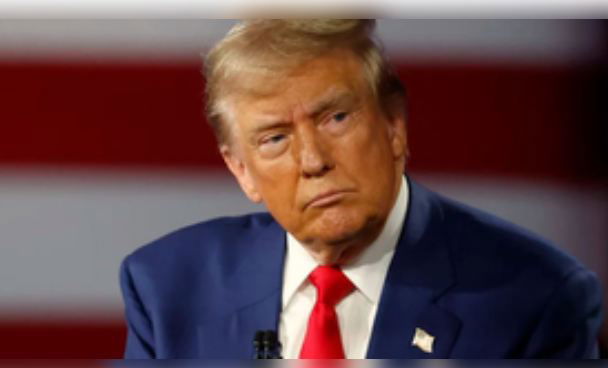America
Trump doubles down on 'America First' agenda of high tariffs, onshoring that could impact India

New York, Sept 6
Doubling down on the 'America First' agenda of his first term, former US President Donald Trump threatened if he is elected again to enforce a policy of high tariffs and bringing back manufacturing that could impact India.
In particular, it would strike at collaborative defence manufacturing that is beginning to take off in India.
"We want an industrial base that can take care of our defence needs 100 per cent" to safeguard national security, he said on Thursday at the Economic Club of New York before an audience of business leaders.
"You can call it what you want. Some might say it's economic nationalism. I call it common sense. I call it America first," he said in a speech loaded with hyperbole.
He cited the distributive manufacturing of F-35 stealth fighter jets, the parts for which are made in different countries, calling it a risk to US defence.
If Trump were elected and introduced the policy of 100 per cent defence manufacture in the US, it could affect, for example, the project to co-produce F-414 jet engines that envisages technology transfer of up to 80 per cent, as well as other joint manufacturing plans.
But implementing it would face several hurdles.
His threat of high tariffs would also affect the manufacturing -- like Apple phones -- that is sprouting in India because of the China factor.
Trump made no mention of India or software or back office jobs, concentrating on China and manufacturing.
At the meeting, Trump outlined his economic policy if he were to return to the White House.
To applause from the audience, he announced he would bring in Elon Musk, the Tesla and Space X boss, to head a government efficiency commission to run a financial and performance audit of the entire federal government and recommend drastic reforms to save "trillions".
At the same time, he said that he would end the mandates for electric vehicles, an industry Musk, who has endorsed him, is heavily invested in.
Deregulating government to free business activity, as he put it, is a key plank of his economic plan.
He said he would turn the US into a "manufacturing superpower" and make "America the world capital for crypto and Bitcoin".
Most of his economic policy outline was about undoing the policies of the current administration, which he pointedly said was that of Vice-President Kamal Harris, his Democratic Party rival.
Not a believer in the impact of climate change, Trump said that he would end the green energy mandates and the restrictions on fossil fuels.
"Energy is going to bring us back," Trump said, and increasing the production of fossil fuels would fight inflation, bringing down the cost of everything from groceries to electricity.
He said that he would enact an energy emergency to achieve the goal.
He made out his tariffs plan -- which many economists have said would add to the inflation and set back the economy -- to be the panacea for the deficit, the reduced revenues from tax cuts and higher spending for some of his plans.
From the higher tariffs, Trump said he would create a sovereign wealth fund like that of countries like Singapore that would "invest wisely" in infrastructure and in industries with the advice of private sector investors and its "gigantic returns" would rundown the national debt.
While he hit at China at several points, there was a measure of ambiguity.
Trump called President Xi Jinping a "dear, dear friend" and a very "fierce" and "smart" person.
"We had a very good relationship with China until Covid" epidemic undid it, he said.
"I believe we will have a very good relationship with China and with a lot of other countries that we're not getting along with too well today," he said, adding that it was "very important that we get along with the rest of the world" because of the nuclear threat.
As he always does at his meetings, he made ad hominem attacks on Harris, calling her a "Communist" and a "Marxist", who was trying to adopt some of his policies.
Some of his plan like threats to end defence manufacturing abroad and across-the-board tariff hikes are unlikely to work the way he claims because of underlying alliances, the web of geostrategic interests, reciprocal trade, and immediate supply chain issues.
While in office Trump tangled with India over tariffs, making the duties on Harley-Davidson motorcycles a cause celebre.
He hiked duties on steel and aluminum imports and eliminated the Generalised Scheme of Preferences for some Indian exports and New Delhi retaliated by raising tariffs mostly on agricultural exports like apples and almonds.



































